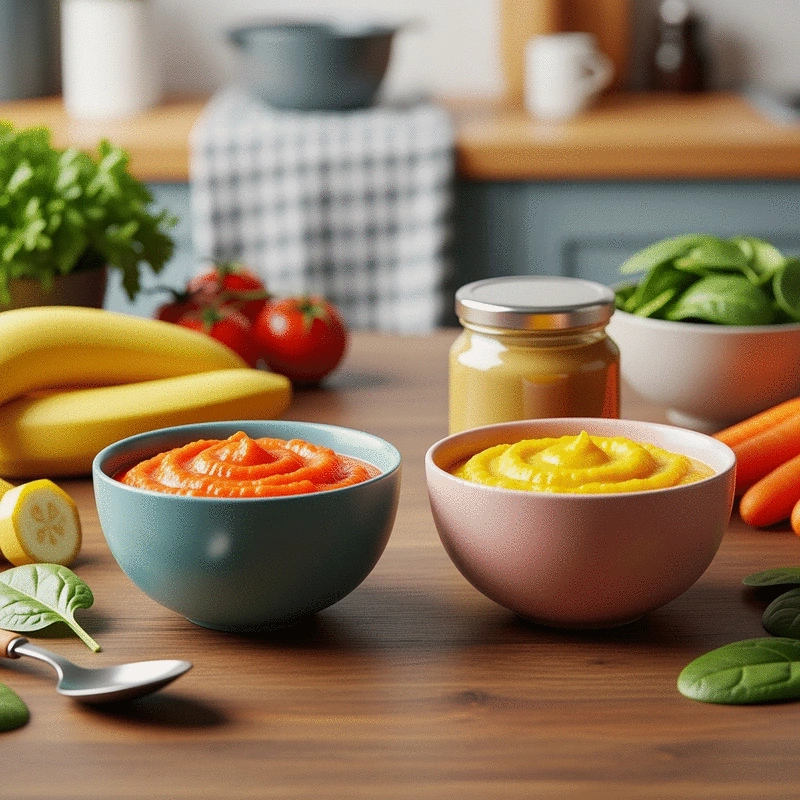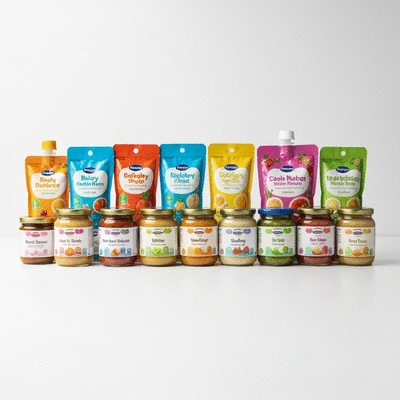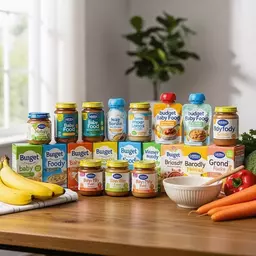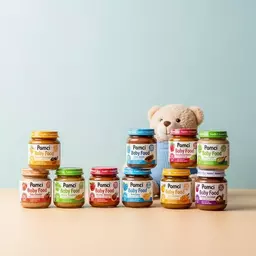Homemade or Store-Bought Baby Food?

As you contemplate the best feeding options for your little one, consider the profound impact that your choices can make on their early development. Striking the right balance between homemade and store-bought baby food can create a nurturing environment for your baby’s taste exploration!
What You Will Learn
- Homemade baby food offers complete control over ingredients, ensuring quality and freshness tailored to your baby's needs.
- Store-bought baby food often includes added vitamins and minerals, providing essential nutrients that support growth.
- While homemade options can be healthier, they require significant time and effort for preparation, which may not suit all parents' lifestyles.
- Store-bought baby food is convenient and often comes in a variety of flavors, perfect for busy parents looking for quick meal solutions.
Homemade vs. Store-Bought Baby Food: A Comprehensive Comparison
This visual highlights the key distinctions, pros, and cons of homemade versus store-bought baby food, focusing on factors important to Australian parents.
Homemade: The Benefits
- ✓Cost-Effective
- ✓Full Ingredient Control
- ✓Organic Options
- ✓Tailored Nutrition
Store-Bought: The Advantages
- ★Ultimate Convenience
- ★Nutritional Fortification
- ★Regulatory Standards (AU)
- ★Wide Flavor Variety
Homemade: The Challenges
- ✗Significant Time Commitment
- ✗Effort for Preparation
- ✗Storage & Safety Critical
- ✗Kitchen Cleanup
Store-Bought: The Drawbacks
- ⚠Potential Additives
- ⚠Less Ingredient Transparency
- ⚠Higher Long-Term Cost
- ⚠Can Lack Freshness
Understanding Homemade vs Store-Bought Baby Food
As a parent, deciding between homemade and store-bought baby food can feel overwhelming. Each option has its unique advantages and challenges that matter to us Australian parents. In this section, we’ll explore the fundamental distinctions, focusing on nutritional insights and preparation methods that suit every family's needs! For a deeper dive into making your own baby food, check out our Homemade Baby Food Recipes Guide.
Homemade baby food allows for complete control over ingredients, making it easier to cater to your baby's specific taste preferences and dietary restrictions. On the other hand, store-bought baby food offers convenience and quick access to a variety of flavors, perfect for busy lifestyles. Let’s dive deeper into what really matters!

Key Differences That Matter to Australian Parents
When comparing homemade to store-bought baby food, consider the following key differences:
- Ingredient Control: Homemade baby food lets you choose exactly what goes into your child's meals, providing peace of mind about quality and freshness.
- Nutritional Content: Store-bought options often contain added vitamins and minerals, ensuring your baby gets essential nutrients.
- Preparation Time: Making baby food at home can be time-consuming, while store-bought options are ready to eat!
- Flavor Variety: Store-bought baby food typically offers a wider range of flavors, which can be more appealing to babies exploring new tastes.
These differences play a significant role in our decision-making process as parents. What fits our lifestyle? Are we looking for healthy, home-cooked meals, or do we need the convenience that comes with store-bought options? Finding that balance is key!
The Importance of Nutritional Insights for Baby's Development
The nutritional content of baby food significantly impacts our little ones' growth and health. Babies require specific nutrients to support their rapidly developing bodies and brains. For instance, iron is crucial for cognitive development, while healthy fats play a vital role in brain growth.
As we consider our options, let's keep in mind that homemade food can be tailored to pack in these essential nutrients, ensuring our babies receive the best start possible. On the flip side, many store-bought options are fortified with vitamins and minerals to support our babies’ needs. It’s all about making informed choices!
Homemade Baby Food Recipes to Try
Ready to get cooking? Here are some simple and healthy homemade baby food recipes that cater to various tastes and dietary needs:
- Sweet Potato Puree: Steam and blend sweet potatoes until smooth. It's naturally sweet and packed with nutrients!
- Carrot and Pea Mash: Cook carrots and peas together, then mash them for a colorful, tasty option.
- Apple and Pear Sauce: Cook diced apples and pears with a sprinkle of cinnamon for a delicious dessert!
- Avocado Delight: Simply mash ripe avocado for a creamy, healthy fat source that babies love.
These recipes are not only easy to prepare but also customizable to suit your baby's preferences. Have fun experimenting with flavors, and don't hesitate to share your own favorites in the comments below!
Evaluating the Pros of Homemade Baby Food
Now that we’ve explored the key differences, let’s take a closer look at the pros of making baby food at home. It's all about making choices that benefit both you and your baby!
Cost-Effective Choices for Budget-Conscious Families
One of the biggest advantages of homemade baby food is its cost-effectiveness. Preparing food at home often means using seasonal fruits and vegetables, which can save money compared to frequently purchasing store-bought products.
Plus, you can prepare larger batches and freeze portions for later use. This approach is not only economical but also minimizes food waste. What can be better than saving money while feeding your baby fresh meals?
Control Over Ingredients and Nutrition
Homemade baby food allows for full control over ingredients! This means you can select organic produce, avoid unnecessary additives, and cater to any dietary requirements your baby may have. Knowing exactly what goes into your baby’s meals is empowering. For more details on ingredient choices, read our guide on Organic Baby Food Ingredients.
For instance, if your baby has allergies or sensitivities, you can easily tweak recipes to avoid harmful ingredients. It’s all about creating a healthy foundation for their future!
Benefits of Organic Baby Food in Homemade Preparations
Using organic ingredients in your homemade baby food truly enhances its nutritional value. Organic fruits and vegetables are often grown without harmful pesticides or chemicals, giving parents peace of mind regarding what their babies are consuming.
Additionally, organic options tend to be richer in nutrients, which is essential for your baby's overall health and development. If you're passionate about providing the best for your little one, opting for organic can be a fantastic choice!
Quick Summary
Here's a brief recap of the key points discussed so far:
- Homemade vs Store-Bought: Homemade baby food offers control over ingredients, while store-bought options provide convenience and variety.
- Nutritional Insights: Both options can be nutritious, but homemade food can be tailored to meet specific dietary needs, whereas store-bought often contains added vitamins.
- Cost Considerations: Homemade baby food can be more economical in the long run, but the time commitment is a factor for busy parents.
- Safety First: Proper food handling and storage are crucial for homemade baby food to ensure safety and freshness.
Weighing the Cons of Homemade Baby Food
Time and Effort Required for Preparation
Making homemade baby food can be a wonderful experience, but it does require a significant time commitment. Between selecting fresh ingredients, cooking, and blending, it can feel overwhelming, especially for busy parents! I’ve been there myself, trying to juggle meal prep while managing nap times and playdates.
To give you a clearer picture, here are some common tasks involved in making homemade baby food:
- Planning and shopping for ingredients
- Cooking different fruits and vegetables
- Blending or pureeing to the right consistency
- Cleaning up the kitchen afterwards
While the end product is often healthier, the reality is that time can be a luxury when you have a little one. It's essential to consider your own schedule and see if you can fit this into your day-to-day life without adding stress!
Safety and Storage Considerations
When preparing baby food at home, safety is key! Homemade baby food can spoil more quickly than store-bought options. It’s crucial to follow safe food handling practices to prevent any health risks for your little one. Here are some tips to ensure your homemade baby food stays safe:
- Always wash your hands and surfaces before preparing food.
- Store homemade food in airtight containers to maintain freshness.
- Label containers with the date and type of food to keep track of freshness.
- Avoid storing food for more than two to three days in the fridge.
By being mindful of these considerations, you can enjoy the benefits of homemade baby food while keeping your baby safe and healthy. Remember, being informed about food safety can make all the difference!

Exploring the Pros of Store-Bought Baby Food
Convenience and Accessibility for Modern Parents
Store-bought baby food is undeniably convenient, especially for modern parents juggling multiple responsibilities. With just a quick trip to the supermarket or a few clicks online, you can stock up on a variety of nutritious meals tailored for your baby!
Many options are available right at your fingertips, including:
- Ready-to-eat purees in convenient pouches or jars
- Variety packs catering to different age groups
- Portable options ideal for on-the-go meals
This convenience can be a lifesaver during busy days! It allows parents to focus on creating precious moments with their little ones without the added hassle of meal prep.
Nutritional Fortification and Regulations in Australia
One of the significant benefits of store-bought baby food is the nutritional fortification that many brands offer. In Australia, baby food products are regulated to ensure they meet specific nutritional standards, providing peace of mind for parents. These foods are often fortified with essential vitamins and minerals that support your baby's growth and development.
It's important to note that these regulations mean that, while you're opting for convenience, you're also providing your baby with balanced nutrition. This can be particularly beneficial if you’re uncertain about your own homemade recipes or if time constraints make cooking a challenge.
Popular Baby Food Brands in Australia
When it comes to store-bought baby food, there are many well-known brands that Australian parents trust. Here’s a quick look at some favorites:
- Heinz: Offers a wide range of flavors and textures suitable for various stages.
- Little Freddie: Focuses on organic ingredients and high-quality nutrition.
- Bellamy's Organic: Provides certified organic baby food products for health-conscious families.
- Pure Baby: Known for their simple ingredients and commitment to quality.
These brands not only provide variety but also prioritize nutrition, making it easier for parents to choose healthy options for their babies. With so many choices out there, you can find the right fit for your little one!
Recognizing the Cons of Store-Bought Baby Food
Potential Additives and Lack of Ingredient Transparency
While store-bought baby food offers many benefits, there are also concerns about additives and preservatives. Some products may contain unnecessary ingredients that can spark questions in the minds of health-conscious parents. It’s crucial to read labels carefully!
Here are a few things to watch out for when selecting store-bought options:
- Preservatives that extend shelf life
- Added sugars or artificial flavors
- Unclear sourcing of ingredients
By being informed about what goes into your baby's food, you can make choices that align with your family’s values. Remember, transparency is key to ensuring you're providing the best for your little one!
Cost Implications Over Time
Although store-bought baby food can be convenient, it’s important to consider the long-term costs. Over time, purchasing pre-packaged meals can add up and strain your budget. It’s wise to evaluate your expenses regularly! For a detailed analysis, explore our Top Baby Food Brands Compared.
To help you gauge the financial aspect, consider these points:
- Calculate monthly spending on store-bought baby food.
- Compare this with the cost of making homemade meals.
- Factor in potential savings from bulk purchases or sales.
Keeping a close eye on your budget can help you make informed decisions regarding your baby's nutrition without overspending. Balance is key to enjoying the journey!
Frequently Asked Questions About Baby Food
Q1: What are the main benefits of homemade baby food?
A1: Homemade baby food offers complete control over ingredients, allowing parents to choose organic produce, avoid additives, and tailor meals to specific dietary needs. It is also generally more cost-effective in the long run.
Q2: What are the advantages of store-bought baby food?
A2: Store-bought baby food provides ultimate convenience, is often fortified with essential vitamins and minerals, adheres to regulatory standards (especially in Australia), and offers a wide variety of flavors.
Q3: What are the challenges of making homemade baby food?
A3: Homemade baby food requires a significant time commitment for preparation (planning, cooking, blending, cleaning) and demands careful attention to storage and safety to prevent spoilage.
Q4: What should parents watch out for in store-bought baby food?
A4: Parents should be mindful of potential additives, preservatives, added sugars, artificial flavors, and less ingredient transparency. Always read labels carefully to ensure the product aligns with your preferences.
Q5: How can I ensure my homemade baby food is safe?
A5: To ensure safety, always wash hands and surfaces thoroughly, store homemade food in airtight, labeled containers, and avoid storing refrigerated food for more than two to three days.
Recap of Key Points
Here is a quick recap of the important points discussed in the article:
- Ingredient Control: Homemade baby food allows you to select fresh ingredients, tailoring meals to your baby's dietary needs.
- Nutritional Insights: Nutritional content is crucial for your baby's growth; homemade options can be packed with nutrients, while store-bought foods may be fortified.
- Convenience: Store-bought baby food offers quick and easy meal options, perfect for busy parents.
- Flavor Variety: Store-bought baby food usually provides a wider range of flavors, appealing to babies as they explore new tastes.
- Cost-Effectiveness: Homemade baby food can be more economical, especially when using seasonal ingredients and preparing in bulk.
- Safety Practices: When making homemade baby food, ensure safe food handling and proper storage to maintain freshness.
Popular Posts
 What if I told you that making your own baby food could not only save you money but also give you to
What if I told you that making your own baby food could not only save you money but also give you to
 What if the choice of your baby's food could shape their entire approach to nutrition for life? As y
What if the choice of your baby's food could shape their entire approach to nutrition for life? As y
 As you navigate the often overwhelming world of baby food shopping, it's essential to arm yourself w
As you navigate the often overwhelming world of baby food shopping, it's essential to arm yourself w
 As you embark on the journey of selecting the best baby food for your little one, you might wonder h
As you embark on the journey of selecting the best baby food for your little one, you might wonder h
